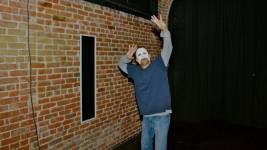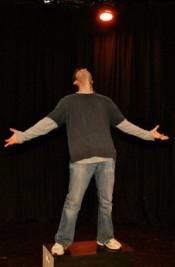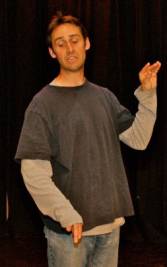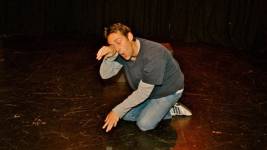
If it takes guts merely for an actor to stand up in front of an audience and play a role, imagine how much more courage is required when there’s no one else on stage to be his safety net—and the role that he’s playing is himself.
Brian Stanton accepts this challenge in Blank, the actor’s funny, moving, thought-provoking autobiographical look at his identity as an adult adopted child with two birth certificates, one as Brian Timothy Stanton and the other as Blank.
“Blank! I’m Blank!” exclaims Brian upon seeing that other birth certificate for the first time. “I mean I know I’m Brian, but I started out as Blank. There has to be something about Blank that is part of who I am, right? So, who the hell is Blank? Blank! I feel like there are two of me all of a sudden. Blank! Jesus! Like I don’t already have issues, I’m an actor!”
It is this need to discover just who “Blank” is that sent the then 20something Brian in pursuit of the 16-year-old who gave birth to him. The same need now sends Brian-at-35 on this very public search for just who actor/husband/father/son Brian Stanton is.
In the process, the oh-so talented star of No Sex Please, We’re British, Is He Dead?, Bright Ideas, and Tom, Dick, and Harry (check out StageSceneLA’s rave reviews) portrays not just himself, but a bevy of real-life characters who have shaped the man Brian Stanton is today.
There’s Breeze, Brian’s flamboyant drama teacher who pronounces the “oe” in Oedipus like the “e” in Edith, and dubs himself the “rock n’ roll professor”; Mrs. Nash, Brian’s sweet old 2nd grade teacher, who insists that young Brian can’t possibly be adopted because he isn’t “Oriental” like his adopted classmate Chrissy; Ma, Brian’s chain-smoking mother who is so encouraging of her son’s identity search that she finds Brian’s birth mother in the phone book and makes the first call; best friend Adam, a fellow adoptee who has no interest in searching for his own birth parents because “We’re all actually 99.9% identical on the genome level, so aren’t we all kind of one big family anyway?”; Doc, Brian’s “long-winded, slightly senile” former undergrad professor, who has his own particular pearls of wisdom to impart; Fr. Stark, Brian’s high school priest who’s not above a little minor physical torture when the young man dares question the Bible as literal fact; Big Grandma, “90, still working, and planning her next annual adventure, riding bareback through the Grand Tetons”; Gramps, who post-stroke “lost all feeling on the right side of his body, and lost all vocabulary as well except for: Hey, OK, And, Come on, Hi, Bye, Yes, No, and 1, 2, 3. Oh! And all curse words;” and several more equally well drawn characters.
Blank offers far more than just one actor’s life story and a chance for him to portray more (and more diverse) characters in 65 minutes than his career would normally allow him in a year or more, though this Stanton does indeed do to perfection, each character instantly recognizable by his or her unique voice and body language. Blank is a theatrical piece likely to resonate with anyone who has ever adopted, been adopted, known someone who has adopted or been adopted, or imagined what it might be like to be in that situation. That is to say that pretty much everyone will be able to relate in some way to Stanton’s search (and struggle) for a sense of identity.
When one particularly shocking aspect of Stanton’s birth is revealed to young Brian’s (and the audience’s) horror, Blank does take a rather too artsy (for this reviewer) turn, the actor/writer engaging in a conversation with what turns out to be blind prophet Tiresias. The prolonged exchange (underscored with the scratching noise of an old vinyl LP) makes dramatic sense, as Stanton begins Blank with himself as a young acting student blanking on an Oedipus monolog, but lost me there for a while.
Other than that segment, Blank held this reviewer enthralled, amused, and emotionally touched from start to finish.
Credit for Blank’s success must be shared between its actor/writer and its director, McKerrin Kelly (a gifted actress herself). Kelly has clearly had a hand in shaping and fine-tuning Stanton’s impressive work here and in keeping the production visually varied, no small task on a virtually blank black stage, save for a couple boxes and some words and phrases scrawled on one of its walls—an actor’s guide to creating his character’s back story. Rob Fritz’s lighting design helps immensely as well, as do Erin Scott’s sound design and Christine Suarez’s movement design. Dan Mailley is scenic designer and Kelly Passinault is stage manager.
Next up for Blank are two more performances of its Southwest Premiere at Dallas-Fort Worth’s DFW Fringe Festival, though hopefully Stanton can package the production and take it wherever its journey leads. Having loved Brian Stanton’s comedic work over the past several years, I feel now that I know not only the actor but the man. This is a solo show well worth seeing.
Lounge Theatre, 6201 Santa Monica Blvd., Hollywood.
www.lonestarensemble.org
–Steven Stanley
June 13, 2010







 Since 2007, Steven Stanley's StageSceneLA.com has spotlighted the best in Southern California theater via reviews, interviews, and its annual StageSceneLA Scenies.
Since 2007, Steven Stanley's StageSceneLA.com has spotlighted the best in Southern California theater via reviews, interviews, and its annual StageSceneLA Scenies.







 COPYRIGHT 2025 STEVEN STANLEY :: DESIGN BY
COPYRIGHT 2025 STEVEN STANLEY :: DESIGN BY